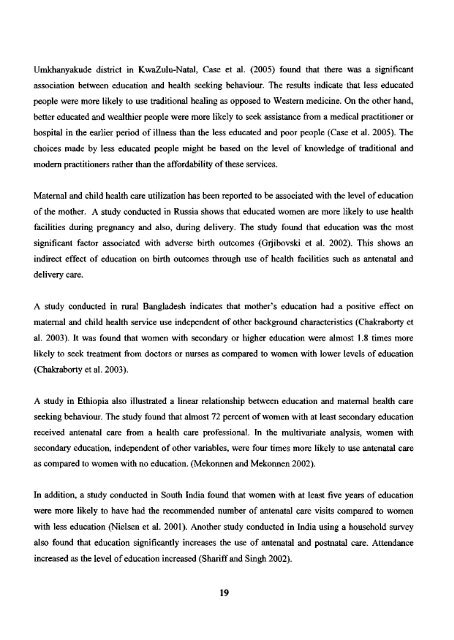an examination of the role of antenatal care attendance in ...
an examination of the role of antenatal care attendance in ...
an examination of the role of antenatal care attendance in ...
You also want an ePaper? Increase the reach of your titles
YUMPU automatically turns print PDFs into web optimized ePapers that Google loves.
Umkh<strong>an</strong>yakude district <strong>in</strong> KwaZulu-Natal, Case et al. (2005) found that <strong>the</strong>re was a signific<strong>an</strong>t<br />
association between education <strong>an</strong>d health seek<strong>in</strong>g behaviour. The results <strong>in</strong>dicate that less educated<br />
people were more likely to use traditional heal<strong>in</strong>g as opposed to Western medic<strong>in</strong>e. On <strong>the</strong> o<strong>the</strong>r h<strong>an</strong>d,<br />
better educated <strong>an</strong>d wealthier people were more likely to seek assist<strong>an</strong>ce from a medical practitioner or<br />
hospital <strong>in</strong> <strong>the</strong> earlier period <strong>of</strong> illness th<strong>an</strong> <strong>the</strong> less educated <strong>an</strong>d poor people (Case et al. 2005). The<br />
choices made by less educated people might be based on <strong>the</strong> level <strong>of</strong> knowledge <strong>of</strong> traditional <strong>an</strong>d<br />
modern practitioners ra<strong>the</strong>r th<strong>an</strong> <strong>the</strong> affordability <strong>of</strong> <strong>the</strong>se services.<br />
Maternal <strong>an</strong>d child health <strong>care</strong> utilization has been reported to be associated with <strong>the</strong> level <strong>of</strong> education<br />
<strong>of</strong> <strong>the</strong> mo<strong>the</strong>r. A study conducted <strong>in</strong> Russia shows that educated women are more likely to use health<br />
facilities dur<strong>in</strong>g pregn<strong>an</strong>cy <strong>an</strong>d also, dur<strong>in</strong>g delivery. The study found that education was <strong>the</strong> most<br />
signific<strong>an</strong>t factor associated with adverse birth outcomes (Grjibovski et al. 2002). This shows <strong>an</strong><br />
<strong>in</strong>direct effect <strong>of</strong> education on birth outcomes through use <strong>of</strong> health facilities such as <strong>an</strong>tenatal <strong>an</strong>d<br />
delivery <strong>care</strong>.<br />
A study conducted <strong>in</strong> rural B<strong>an</strong>gladesh <strong>in</strong>dicates that mo<strong>the</strong>r's education had a positive effect on<br />
maternal <strong>an</strong>d child health service use <strong>in</strong>dependent <strong>of</strong> o<strong>the</strong>r background characteristics (Chakraborty et<br />
al. 2003). It was found that women with secondary or higher education were almost 1.8 times more<br />
likely to seek treatment from doctors or nurses as compared to women with lower levels <strong>of</strong> education<br />
(Chakraborty et al. 2003).<br />
A study <strong>in</strong> Ethiopia also illustrated a l<strong>in</strong>ear relationship between education <strong>an</strong>d maternal health <strong>care</strong><br />
seek<strong>in</strong>g behaviour. The study found that almost 72 percent <strong>of</strong> women with at least secondary education<br />
received <strong>an</strong>tenatal <strong>care</strong> from a health <strong>care</strong> pr<strong>of</strong>essional. In <strong>the</strong> multivariate <strong>an</strong>alysis, women with<br />
secondary education, <strong>in</strong>dependent <strong>of</strong> o<strong>the</strong>r variables, were four times more likely to use <strong>an</strong>tenatal <strong>care</strong><br />
as compared to women with no education. (Mekonnen <strong>an</strong>d Mekonnen 2002).<br />
In addition, a study conducted <strong>in</strong> South India found that women with at least five years <strong>of</strong> education<br />
were more likely to have had <strong>the</strong> recommended number <strong>of</strong> <strong>an</strong>tenatal <strong>care</strong> visits compared to women<br />
with less education (Nielsen et al. 2001). Ano<strong>the</strong>r study conducted <strong>in</strong> India us<strong>in</strong>g a household survey<br />
also found that education signific<strong>an</strong>tly <strong>in</strong>creases <strong>the</strong> use <strong>of</strong> <strong>an</strong>tenatal <strong>an</strong>d postnatal <strong>care</strong>. Attend<strong>an</strong>ce<br />
<strong>in</strong>creased as <strong>the</strong> level <strong>of</strong> education <strong>in</strong>creased (Shariff <strong>an</strong>d S<strong>in</strong>gh 2002).<br />
19

















